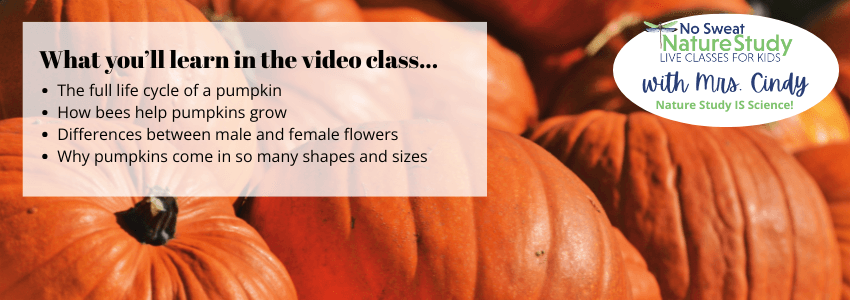Why Do Some Plants Grow Giant Fruits? Seasonal Nature Study
Pumpkins are more than just decorations for the autumn season. They’re fascinating fruits with an incredible story! In this podcast episode, kids will enjoy a pumpkin nature study to discover why some plants produce tiny fruits while others grow giants, like the record-breaking pumpkins that can weigh over a thousand pounds. Along the way, we’ll talk about traits, pollination, and the special care farmers give to help giant pumpkins thrive.
Whether your child is curious about plants or just wants to know why in the world pumpkins can get so big, this episode is perfect for the season ahead. It’s full of surprising facts and kid-friendly explanations that will make pumpkins at the farmers market, grocery store, or front porch decorations feel even more fascinating.
Pumpkin Nature Study
To help your children listen closely and remember what they’ve learned, here is a set of questions you can use after listening to the episode.
- What makes a pumpkin a fruit? (It grows from the flower and contains seeds.)
- What do scientists call the instructions for traits that are passed from parents to offspring? (Traits.)
- What variety of pumpkin is famous for being able to grow to enormous sizes? (Atlantic Giant.)
- What do farmers do in selective breeding? (They choose parent plants with certain traits and control pollination to pass those traits on.)
- How do farmers hand-pollinate pumpkins? (They transfer pollen from a chosen male flower to a chosen female flower and cover it so no stray pollen gets in.)
- Why do giant-pumpkin growers usually allow only one pumpkin to grow on a vine? (So the plant’s energy goes into that single fruit, making it larger.)
- What are some things farmers do to care for giant pumpkins besides pollination? (They give rich soil, lots of water, prune vines, and protect the pumpkin as it grows.)
- Why do some fruits, like crabapples, stay small instead of growing huge? (Being small helps animals and birds carry them away, which spreads the seeds.)
Pumpkin Nature Study Video Class
Get ready for the video class about pumpkins inside the No Sweat Nature Study membership! In this live or recorded video lesson, follow a pumpkin’s life cycle step by step, discover the difference between male and female blossoms, and peek inside to label seeds, flesh, and rind in a beautifully detailed nature journal page.
Also, explore the history of pumpkins as a symbol of autumn, compare different pumpkin varieties, and discover the clever adaptations that help pumpkins survive. It’s a fun and seasonally perfect way for kids in 1st–8th grade to enjoy science at home. Families can join today at NoSweatNatureStudy.com to enjoy this brand-new pumpkin class along with more than 175 others!

Free Nature Observation Printable Packet for All Seasons
The No Sweat Nature Study Podcast community has been sharing recommendations of excellent nature-themed books. Click here to find a compilation of listener favorites!
Would you like to record a voicemail to answer this season’s nature study question?
At the end of each No Sweat Nature Study Podcast episode, Mrs. Cindy includes messages from a few of her friends. You can record a message that she might use on an upcoming episode!
All children must have their parents’ permission before leaving a recording. Parents are also welcome to record their answers.
Each season, there will be a different question to answer. You can see this season’s question below. Think about your answer first, and then follow these simple directions:
- Click the “Start recording” button.
- Tell me your first name. (If you want to tell your age and/or where you live, feel free to do that.)
- You will have 60 seconds to answer the question, but try to be concise.
- Push the play button to listen to your recording before sending it, to ensure it is recorded correctly. If not, record it again.
Please leave a rating or a review on your podcast app! It helps the podcast to show up for more people…which means more families can enjoy science through the wonderful lens of nature study! Thank you!
